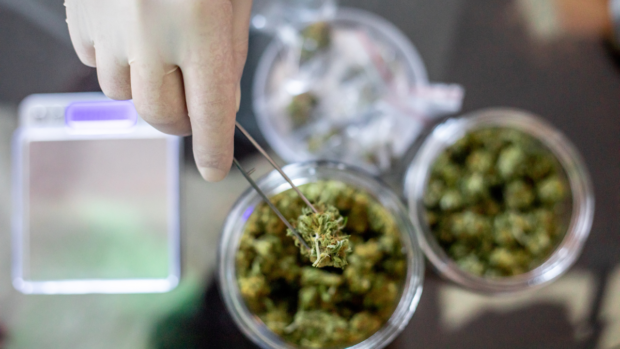Ex-drug felons get first cannabis licenses in New York
Medical personnel wearing protective gloves, holding cannabis bud with tweezers | INQUIERER.net STOCK IMAGE
NEW YORK — Naiomy Guerrero’s brother was stopped by police often and was once convicted on drug charges when marijuana was illegal in New York.
Now, she is setting up a legal cannabis business, a promising new market fraught with pitfalls.
New York state is offering its first 150 licenses for the legal sale of cannabis to people — and their relatives — who have been convicted of offenses related to the drug, including selling.
Besides the cannabis conviction, applicants must also own a profitable business to be eligible for one of the first 150 licenses, which will precede a full opening of the market.
The policy, implemented by the state’s Democratic leaders, seeks to compensate African American and Hispanic communities whose members were disproportionately arrested and convicted during the decades weed was illegal.
“It’s such an exciting moment for my family,” said 31-year-old Guerrero, a Ph.D. art history student whose parents are from the Dominican Republic.
“Especially given where we come from and everything we have been through, with the discriminatory policies that the city has had, like stop and frisk,” she told Agence France-Presse (AFP).
Guerrero recalled that in the 2000s, the New York Police Department’s infamous policy, which disproportionately targeted people of color, meant “we couldn’t be outside without getting picked up by the police.”
“It was just living in a constant, constant state of surveillance and harassment,” she said.
In 2018, a state report estimated that there had been 800,000 arrests for marijuana possession in the previous 20 years.
In 2017, most of those arrested were Blacks (48 percent) and Hispanics (38 percent).
“Prohibition denied people opportunities, it caused divestment in communities, it broke up families,” said Tremaine Wright, chair of the control board for New York’s Office of Cannabis Management (OCM).
Looking to profit
Last month, Guerrero was one of the first 28 successful applicants who received their license to open an official store and sell locally-grown cannabis.
The licenses come more than a year after New York state, home to 20 million people, legalized cannabis use.
In New York City, the smell of weed is now about as ubiquitous as yellow taxis and shiny skyscrapers.
The city government expects the legal cannabis industry to generate $1.3 billion in sales as early as next year and between 19,000 and 24,000 jobs in three years.
These figures represent much-needed tax revenues.
Jeremy Rivera, 36, is another New Yorker looking to profit. He was convicted of a “nonviolent drug offense including cannabis” in 2016. He was released from prison in 2018 and has vowed never to go back.
The heavily tattooed Rivera, who grew up surrounded by crime in the borough of Queens, hopes to be among the next group of licensees.
“I want to become that beacon of light that shows people, ‘Hey listen, I’ve done it. I was a 20-year gang member, I was a year-long-round drug dealer. I made the decision to leave that lifestyle,’” he told AFP.
Unlicensed sellers
While the cannabis program is ambitious, experts say implementation will have its challenges.
One cause of concern is strong competition from unlicensed sellers, who have been emboldened by decriminalization.
They have taken advantage of the lack of controls since legalization, selling on the street, in parks, as well as in smoke shops which are already selling THC edibles, pre-rolls, and flower.
But Rivera sees only opportunities. “You’re also going to have people who never felt comfortable purchasing from the illicit market that are now going to want to purchase from a reputable licensed provider,” he said.
“This is the beginning of the next 100 years of cannabis sales,” he added, taking a puff on a long joint.
RELATED STORIES
Read Next
Don’t miss out on the latest news and information. 
Subscribe to INQUIRER PLUS to get access to The Philippine Daily Inquirer & other 70+ titles, share up to 5 gadgets, listen to the news, download as early as 4am & share articles on social media. Call 896 6000.
No Byline Policy
Editorial Guidelines
Corrections Policy
Source

